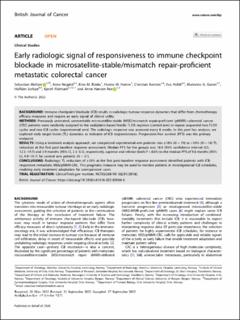| dc.contributor.author | Meltzer, Sebastian | |
| dc.contributor.author | Negård, Anne | |
| dc.contributor.author | Bakke, Kine Mari | |
| dc.contributor.author | Hamre, Hanne Mari | |
| dc.contributor.author | Kersten, Christian | |
| dc.contributor.author | Hofsli, Eva | |
| dc.contributor.author | Guren, Marianne | |
| dc.contributor.author | Sorbye, Halfdan | |
| dc.contributor.author | Flatmark, Kjersti | |
| dc.contributor.author | Ree, Anne Hansen | |
| dc.date.accessioned | 2022-11-03T08:43:21Z | |
| dc.date.available | 2022-11-03T08:43:21Z | |
| dc.date.created | 2022-10-29T12:56:09Z | |
| dc.date.issued | 2022 | |
| dc.identifier.issn | 0007-0920 | |
| dc.identifier.uri | https://hdl.handle.net/11250/3029719 | |
| dc.description.abstract | Background: Immune checkpoint blockade (ICB) results in radiologic tumour response dynamics that differ from chemotherapy efficacy measures and require an early signal of clinical utility.
Methods: Previously untreated, unresectable microsatellite-stable (MSS)/mismatch repair-proficient (pMMR) colorectal cancer (CRC) patients were randomly assigned to the oxaliplatin-based Nordic FLOX regimen (control arm) or repeat sequential two FLOX cycles and two ICB cycles (experimental arm). The radiologic response was assessed every 8 weeks. In this post hoc analysis, we explored early target lesion (TL) dynamics as indicator of ICB responsiveness. Progression-free survival (PFS) was the primary endpoint.
Results: Using a landmark analysis approach, we categorised experimental-arm patients into ≥10% (N = 19) or <10% (N = 16) TL reduction at the first post-baseline response assessment. Median PFS for the groups was 16.0 (95% confidence interval (CI), 12.3–19.7) and 3.9 months (95% CI, 2.3–5.5), respectively, superior and inferior (both P < 0.01) to the median PFS of 9.8 months (95% CI, 4.9–14.7) for control arm patients (N = 31).
Conclusions: Radiologic TL reduction of ≥10% at the first post-baseline response assessment identified patients with ICB-responsive metastatic MSS/pMMR-CRC. This pragmatic measure may be used to monitor patients in investigational ICB schedules, enabling early treatment adaptation for unresponsive cases. | en_US |
| dc.language.iso | eng | en_US |
| dc.publisher | Springer Nature | en_US |
| dc.rights | Navngivelse 4.0 Internasjonal | * |
| dc.rights.uri | http://creativecommons.org/licenses/by/4.0/deed.no | * |
| dc.title | Early radiologic signal of responsiveness to immune checkpoint blockade in microsatellite-stable/mismatch repair-proficient metastatic colorectal cancer | en_US |
| dc.type | Journal article | en_US |
| dc.type | Peer reviewed | en_US |
| dc.description.version | publishedVersion | en_US |
| dc.rights.holder | Copyright 2022 the authors | en_US |
| cristin.ispublished | true | |
| cristin.fulltext | original | |
| cristin.qualitycode | 2 | |
| dc.identifier.doi | 10.1038/s41416-022-02004-0 | |
| dc.identifier.cristin | 2066350 | |
| dc.source.journal | British Journal of Cancer | en_US |
| dc.identifier.citation | British Journal of Cancer. 2022. | en_US |

